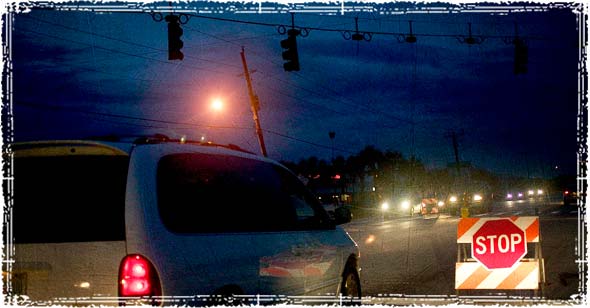Power Outages: every year millions of Americans experience them, yet most people are still surprisingly unprepared to deal with them.

According to research out of Carnegie Mellon University, the average U.S. electrical utility customer will experience somewhere around 214 minutes of power outage each year. It’s estimated that these power outages cost the economy between $20 billion and $55 billion annually.
Are You Prepared for the coming Storm Season?
Every year I sit and watch in amazement as millions of Americans are caught off guard by something that is highly predictable, power outages caused by storms.
During 2011, the U.S. experienced 3,071 reported power outages that affected over 41.8 million people throughout the country. Although we don’t have current statistics on 2012, the number was likely much higher as we seen single storms like Hurricane Sandy and the Mid-Atlantic Storms, leave millions of Americans in the dark for weeks. In fact, during 2012 we saw a huge number of storms that left entire areas of our country without power for well over 72 hours.
It’s really not rocket science; at some point you are going to be affected by a power outage. Our power grid is old, deteriorating, and is not setup to handle even these normal seasonal storms. As our power grid ages, these types of events will increase in regularity and their effects will become longer as our country struggles to keep our antiquated grid, that’s still using 1960s and 70s technology, up and running.
How to Prepare for Power Outages
It’s estimated that somewhere around 90% of the public has little to no emergency preparedness supplies. Please don’t be one of those 90%; it doesn’t take long to prepare yourself to deal with these very predictable events.
The first thing you need to do is take an inventory of your current supplies. Calculate how long you can realistically survive with what you currently have; if you’re not satisfied with the outcome of your inventory assessment, now is the time to take action.
WATER: One of the most critical emergency preparedness supplies that you can have is water; it’s the first thing you should focus on.
During a power grid failure, especially those caused by seasonal storms, there’s a good chance that your area might be affected by a boil water notice. This happens when local water treatment facilities can no longer guarantee the safety of your water due to storm related issues.
To ensure your family has enough water to make it through a disaster, you need to consider stocking 1 gallon of water per day, per person. I recommend having at least a 1- 2 week supply of water on hand at all times.
You should also look into buying a good emergency water filter, and buying something like the Waterbob, which will allow you transform your bathtub into an emergency water reservoir the moment you lose power.
EMERGENCY FOOD: In preparation for any type of disaster, you need to be prepared to feed your family without running to the grocery store. Just like your emergency water supply, you should always have at least a 1 – 2 week supply of emergency food on hand at all times.
In all likelihood, if you’re hit by a storm related power outage, your local grocery stores are going to be stripped bare pretty quickly. And even if you do manage to find food, there’s a good chance the store’s power-reliant payment systems will be down, making it impossible for you to purchase the supplies you need to feed your family.
EMERGENCY SUPPLIES: When the grid goes down, there are a couple of common supplies that you need to have on hand. These supplies should be readily accessible, and you need to stock up on them now; don’t be the person at the store searching for supplies as the storm’s about to hit.
- Camping Supplies: When I’m asked what supplies a person should have on hand to prepare for storm related power outages, I always tell people to pretend they are packing for a camping trip. Chances are you will be without modern conveniences for at least a couple of days, you need to think about how you’ll light your home, cook your food, keep your food at a safe temperature, and deal with sanitation issues.
- Emergency Communication: Read our article on disaster communications, it will give you a good idea of what supplies you should have on hand, and how you’ll get in contact with your loved ones during a power outage.
- Medications: If you rely on emergency medications to live, you should ask your doctor to prescribe you an additional 2 – 4 week supply.
- Emergency Generator: Being able to keep your home up and running during a power outage is sure a lot easier than digging around for candles and eating cold soup from a can. If you can afford one, you should looking to buying a small emergency generator that at minimum can keep your freezer/refrigerator running, along with powering a couple of lights. For advice on selecting the right generator, check out our article on How to Choose the Right Generator.
Food Safety Concerns
If you lose power, and don’t have a way to run an emergency generator, there’s a good chance you’re going to lose some of your stored foods. When it comes to food safety, there are a couple of things to keep in mind.
How Long Will Food Last During a Power Outage?
If the power goes out, the last thing you want to do is open your refrigerator doors. If your doors remain closed, the food in your refrigerator should stay cold for about 4 hours; it will be safe for somewhere around 6 hours. If the food in the refrigerator becomes warmer than 41 degrees, throw it away.
Your freezer should keep its temperature for about 48 hours. The tighter the food is packed, the longer it will keep. One way to ensure your freezer food lasts during a power outage is to fill any empty spaces with 1 gallon jugs of water. The frozen jugs will help keep the freezer cold, and can be used to supplement your water supply if the outage last longer than expected.




once a year, we have a pretend week. We pretend that the grid has totally shut down. we are not able to use the truck, phone is shut off (we have a cell phone for emergencies since I am a diabetic). Power is shut down except what goes to the freezer, but it is taped close. anything with tape is off limits, no matter what. We do not plan it, my daughter simply comes to our house and shuts off the power and we go into seclusion. It’s hard, especially in the heat, but we make it and at the end we better understand what we need. I’m 62 and no, we’re never too old to pretend, especially if you’re learning from it
Wow! I really like that idea. it is also a good way to rotate your stocks.
This is amazing!!! Its almost like having a fire escape plan except for a natural disaster. I wish I lived in a house where I could shut off the power at a moment’s notice.
Preparing for storms is a good way to encourage a reluctant spouse to join the “preparedness side.” Where I live there aren’t many problems which makes it harder to get buy in from my reluctant spouse.
I have been telling my wife and friends for a long time now that things are going to change; by design or by nature. No one is interested, at least not at the present time. I have been working on a “survivalist” type of renewable energy scheme to maintain power for (at the very least) refridgeration. Next on the list is water supply; all the rest can be considered as fluff or creature comforts. The people in this country will learn to WAKE UP!
Try not focusing on the doom and gloom. Talk more about the advantages of preparedness. Do small thing yourself that don’t cost a lot or inconvenience the rest of the family. Then point out “without preaching” look at all the people without …. Good thing WE have … don’t you think it would be a good idea to get a little bit of…
Yoday at my school the power went out(probably because here In Michigan a few days ago we had ice rain) and our schools generator wouldn’t work because its on the roof. And our wifi somehow got disconnected so nobody could really use their phones for light and because I always bring a flashlight with me wherever I go I was using it in the dark hallways and everyone was staring at me like I was crazy.And everyone was real quiet and acting weird. Overall I think they couldn’t handle a simple power outage
this info should be taught in schools .have students understand what to do in Emergencies.
after the fact is not the time to educate people. we as a community must be proactive to protect ourselves, we have become to reliant on what are others going to help you when the SHTF. Knowledge is Strength, Preparation will keep strong and safe.
I’m not prepared for the coming storm season, that’s why I’m here! :D